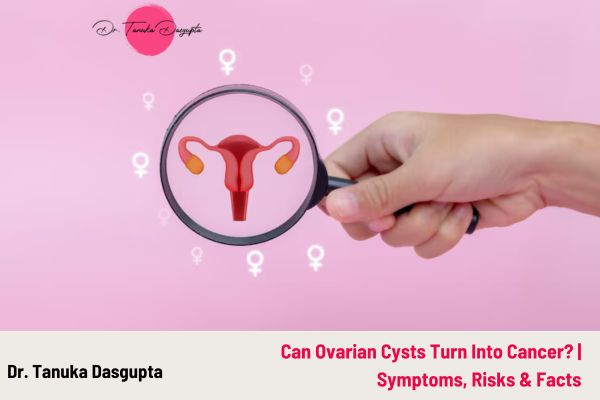Can Ovarian Cysts Turn Into Cancer? Facts You Should Know
By Dr. Tanuka Dasgupta, Consultant Obstetrician & Gynaecologist, Kolkata
Ovarian cysts are a common concern among women of all ages. While most are harmless, the question often arises: Can an ovarian cyst turn into cancer?
Here, Dr. Tanuka Dasgupta, an experienced gynecologist in Kolkata who specializes in high-risk gynecology and complex ovarian issues, breaks down the facts you should know.
What Are Ovarian Cysts?
Ovarian cysts are fluid-filled sacs that form on or within an ovary. Many cysts are part of the normal menstrual cycle and resolve on their own without treatment. However, some may be abnormal and require further evaluation.
Benign vs. Malignant Cysts: Understanding the Difference
“Not all cysts are dangerous. In fact, most are completely benign and don’t need intervention,” says Dr. Tanuka Dasgupta.
Here’s a quick overview:
- Functional Cysts:
Common in reproductive-age women and related to ovulation. These usually go away on their own. - Pathological Cysts:
Includes cystadenomas, dermoid cysts, and endometriomas. Most are non-cancerous but can grow large or cause complications. - Malignant (Cancerous) Cysts:
These are rare but more likely in postmenopausal women or those with a family history of ovarian or breast cancer.
Who Is at Higher Risk for Ovarian Cancer?
While most ovarian cysts are not cancerous, the risk increases in:
- Women over 50
- Postmenopausal women
- Those with a family history of ovarian or breast cancer
- Women with BRCA1 or BRCA2 gene mutations
“A complex or solid-looking cyst, especially in a postmenopausal woman, warrants closer monitoring or surgical evaluation,” explains Dr. Dasgupta.
Symptoms That Shouldn’t Be Ignored
In many cases, cysts don’t cause symptoms. But if you experience any of the following persistently, seek medical advice:
- Pelvic or abdominal pain
- Bloating or pressure in the abdomen
- Irregular menstrual cycles
- Difficulty urinating or frequent urge to urinate
- Unexplained weight loss or fatigue
- Pain during intercourse
How Are Suspicious Cysts Diagnosed?
Dr. Tanuka Dasgupta typically recommends a combination of:
- Ultrasound – to determine the size and nature of the cyst
- CA-125 blood test – a tumor marker that may be elevated in ovarian cancer
- MRI or CT scan – for detailed imaging, especially in complex or unclear cases
When Is Surgery Recommended?
You may need surgery if:
- The cyst is large or persistent
- It causes significant pain or bleeding
- Imaging shows suspicious features
- You are postmenopausal and the cyst does not resolve
Dr. Dasgupta emphasizes:
“Not every cyst requires surgery. We focus on personalized evaluation and recommend surgery only when clinically necessary.”
Final Thoughts from Dr. Tanuka Dasgupta
While the word “cyst” can be alarming, remember that most ovarian cysts are not cancerous. However, early evaluation is key, especially if you are in a high-risk group or experiencing symptoms.
If you’re concerned about an ovarian cyst, don’t panic—but don’t delay either. Schedule a consultation with a qualified gynecologist for a thorough assessment.


